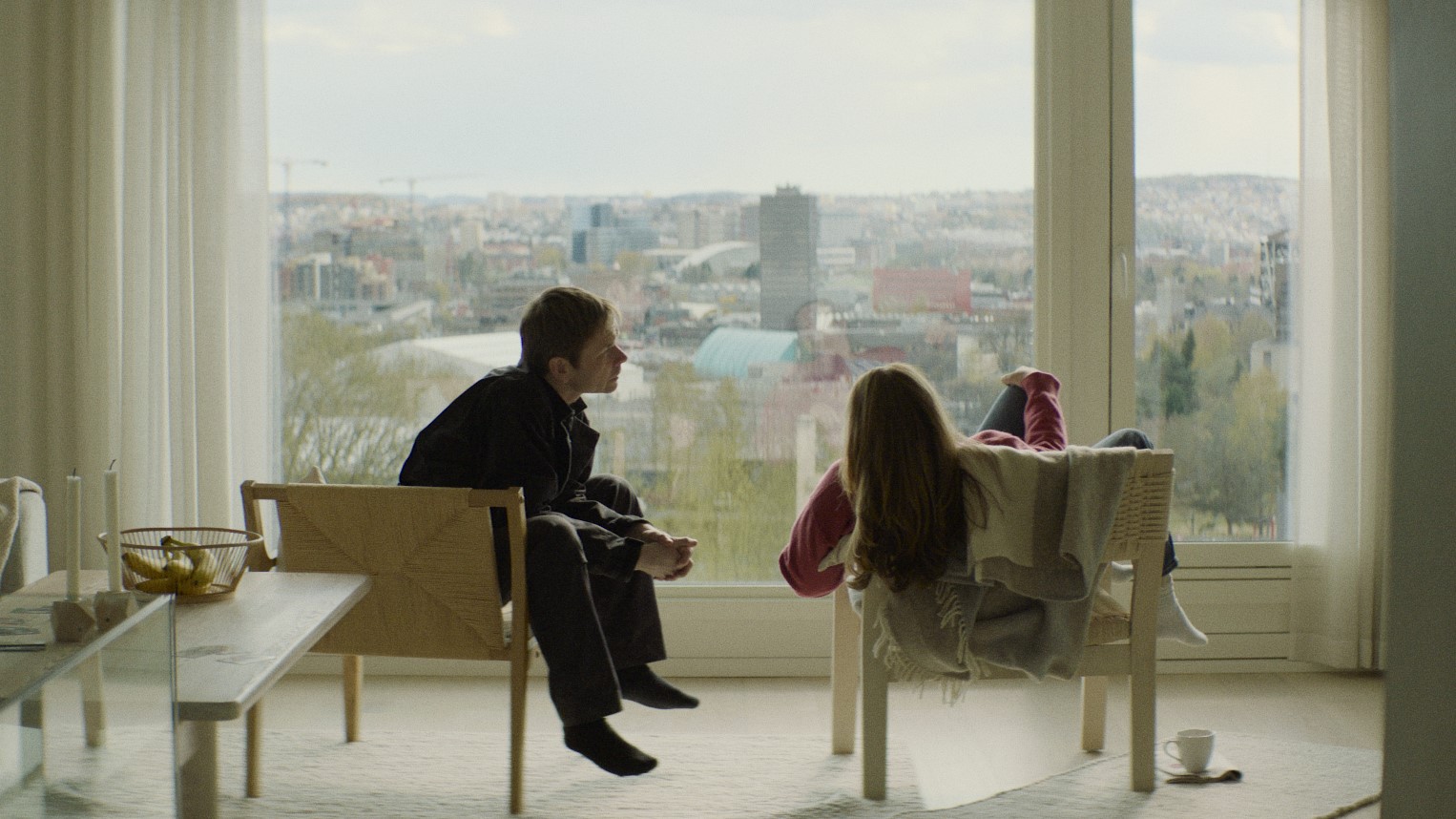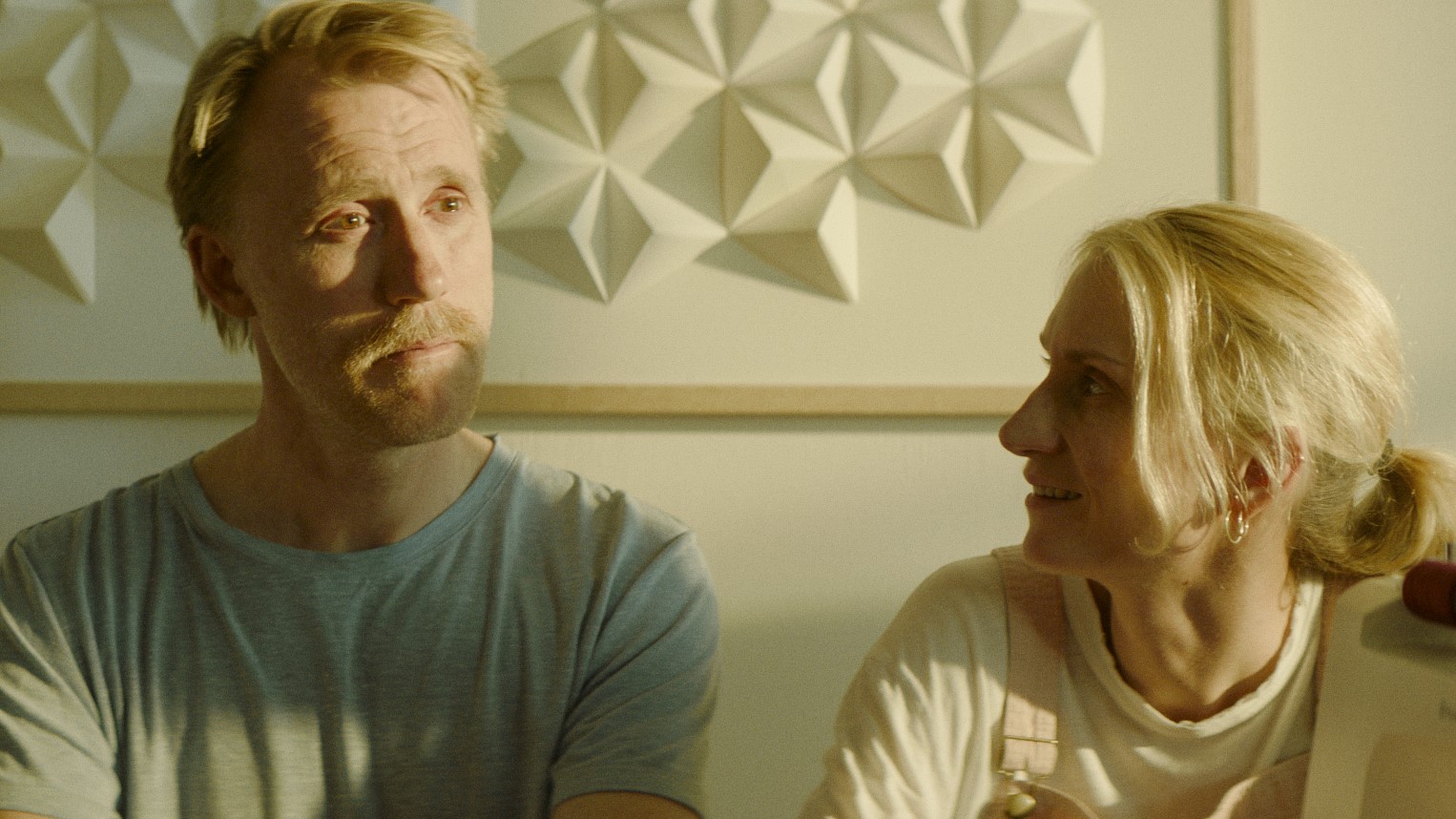Oslo Stories Trilogy: Sex review - sexual identity slips, hurts and heals | reviews, news & interviews
Oslo Stories Trilogy: Sex review - sexual identity slips, hurts and heals
Oslo Stories Trilogy: Sex review - sexual identity slips, hurts and heals
A quietly visionary series concludes with two chimney sweeps' awkward sexual liberation

Two chimney sweeps sit by a window. The boss (Thorbjørn Harr) recounts a dream meeting with David Bowie, who disconcertingly looks at him like he’s a woman. Funny thing, his friend (Jar Gunnar Røise) replies. Yesterday, a male client asked him to have sex, and he did. It felt good. He hasn’t told anyone else, apart from his wife.
Sex opened Dag Johan Haugerud’s Oslo Stories trilogy in Norway, and closes it here, forming an appropriate climax to his distinctive MO. The nameless sweeps’ 15-minute break-room conversation at its start, panning from widescreen one-shot to two-shot with sometimes comic timing, mixes naturalism and a shaggy dog story in its slow-burn discursion. Where Dreams broke the critical taboo on voiceovers with its epic opening monologue, Sex stretches coolly observed conversation, made cinematic by the nuanced movement of bodies and their frame, from neat domestic trappings to the sweeps’ work among the cranes of an Oslo being busily remade, noisome with urban pressures. The exchanged ideas’ rebel nature is another trilogy constant, as sexuality and sexual identity are teased apart. “Having one beer doesn’t make me an alcoholic,” the straight sweep says of gay sex. In a time of polarised sexual absolutes, Haugerud’s admittedly utopian films respond by disarming. Dismantling the border posts, he sets his people free.
 Harr and Røise are Haugerud rep company regulars, notably in Beware of Children (2019), when Harr’s grieving but harsh right-wing politician savaged Røise’s dreamily liberal teacher. They form a tender double-act here. The boss’s heroic effort to receive the sweep’s bombshell as casually as it’s delivered, and the sweep’s obtuse underestimate of its impact, reflected in his casual blocking of the break-room fridge, is a lovely comic dance of expression and movement.
Harr and Røise are Haugerud rep company regulars, notably in Beware of Children (2019), when Harr’s grieving but harsh right-wing politician savaged Røise’s dreamily liberal teacher. They form a tender double-act here. The boss’s heroic effort to receive the sweep’s bombshell as casually as it’s delivered, and the sweep’s obtuse underestimate of its impact, reflected in his casual blocking of the break-room fridge, is a lovely comic dance of expression and movement.
The sweep’s wife (Siri Forberg, above right with Røise) is less sanguine about her husband’s transgression, distraught at the intimacies he’s shared: “Take your face when you’re coming. You look so vulnerable.” Was his arse sore, she wonders, repeating the boss’s typical straight fear, as their son saunters in from school. This marital breakdown becomes the trilogy’s most painful episode, but in a triumph of Norwegian reason, no one shouts.
Sex satirises as well as celebrates Norway’s liberal intellectual dream. The boss’s sang-froid is sorely tested keeping up with philosophical bombardment from every quarter: the singing teacher who quotes Hannah Arendt as she manipulates his tongue, and a doctor’s lecture on Goddess theory and periods to his 13-year-old son, an early victim of Norway’s rat-race prematurely fearing mediocrity, and death. “One day you will die,” Dad reassures him with Haugerud’s sweet, mild truthfulness. “But on all the others you will not.”
 Harr’s character and his wife (Birgitte Larsen, above right with Harr) are both Christian, an admission Røise’s sweep recalls as braver than saying he’s gay. As with the rapturous understanding of Oslo’s waterfront statuary as Christ’s blessing on omnisexual Oslo in Love, Christianity here is Christ-like. “I don’t think Jesus came to Earth to protect the nuclear family or to police people’s love lives,” Harr’s sweep tells Røise’s. Haugerud told me recently that, though he lost his own faith long ago, he retains friends in a former Christian community, and wished to balance recent cinema’s “predatory” characterisations: “There are a lot of sensible, good-thinking Christian people around, and we also need to show that.” Traces of Christ’s testing moral essence, he acknowledged, remain in his thinking. It’s finally reflected in Harr’s character’s slinky hot pant-wearing disco song and dance to divine acceptance of his feminine side.
Harr’s character and his wife (Birgitte Larsen, above right with Harr) are both Christian, an admission Røise’s sweep recalls as braver than saying he’s gay. As with the rapturous understanding of Oslo’s waterfront statuary as Christ’s blessing on omnisexual Oslo in Love, Christianity here is Christ-like. “I don’t think Jesus came to Earth to protect the nuclear family or to police people’s love lives,” Harr’s sweep tells Røise’s. Haugerud told me recently that, though he lost his own faith long ago, he retains friends in a former Christian community, and wished to balance recent cinema’s “predatory” characterisations: “There are a lot of sensible, good-thinking Christian people around, and we also need to show that.” Traces of Christ’s testing moral essence, he acknowledged, remain in his thinking. It’s finally reflected in Harr’s character’s slinky hot pant-wearing disco song and dance to divine acceptance of his feminine side.
It's that essential kindness, a soft though realistic heart also reflected in cinematographer Cecilie Semec’s blissful summer light, which adds a visionary element to this quietly beautiful trilogy.
- Read more film reviews on theartsdesk
rating
Explore topics
Share this article
The future of Arts Journalism
You can stop theartsdesk.com closing!
We urgently need financing to survive. Our fundraising drive has thus far raised £49,000 but we need to reach £100,000 or we will be forced to close. Please contribute here: https://gofund.me/c3f6033d
And if you can forward this information to anyone who might assist, we’d be grateful.

Subscribe to theartsdesk.com
Thank you for continuing to read our work on theartsdesk.com. For unlimited access to every article in its entirety, including our archive of more than 15,000 pieces, we're asking for £5 per month or £40 per year. We feel it's a very good deal, and hope you do too.
To take a subscription now simply click here.
And if you're looking for that extra gift for a friend or family member, why not treat them to a theartsdesk.com gift subscription?
more Film
 Oslo Stories Trilogy: Sex review - sexual identity slips, hurts and heals
A quietly visionary series concludes with two chimney sweeps' awkward sexual liberation
Oslo Stories Trilogy: Sex review - sexual identity slips, hurts and heals
A quietly visionary series concludes with two chimney sweeps' awkward sexual liberation
 Sorry, Baby review - the healing power of friendship in the aftermath of sexual assault
Eva Victor writes, directs and stars in their endearing debut feature
Sorry, Baby review - the healing power of friendship in the aftermath of sexual assault
Eva Victor writes, directs and stars in their endearing debut feature
 Blu-ray: Who Wants to Kill Jessie?
Fast-paced and visually inventive Czech comedy
Blu-ray: Who Wants to Kill Jessie?
Fast-paced and visually inventive Czech comedy
 Oslo Stories Trilogy: Love review - freed love
Gay cruising offers straight female lessons in a heady ode to urban connection
Oslo Stories Trilogy: Love review - freed love
Gay cruising offers straight female lessons in a heady ode to urban connection
 Beating Hearts review - kiss kiss, slam slam
Romance and clobberings in a so-so French melodrama
Beating Hearts review - kiss kiss, slam slam
Romance and clobberings in a so-so French melodrama
 Materialists review - a misfiring romcom or an undercooked satire?
Writer-director Celine Song's latest can't decide what kind of film it is
Materialists review - a misfiring romcom or an undercooked satire?
Writer-director Celine Song's latest can't decide what kind of film it is
 theartsdesk Q&A: actor Leonie Benesch on playing an overburdened nurse in the Swiss drama 'Late Shift'
The Guildhall-trained German star talks about the enormous pressures placed on nurses and her admiration for British films and TV
theartsdesk Q&A: actor Leonie Benesch on playing an overburdened nurse in the Swiss drama 'Late Shift'
The Guildhall-trained German star talks about the enormous pressures placed on nurses and her admiration for British films and TV
 Freakier Friday review - body-swapping gone ballistic
Lindsay Lohan and Jamie Lee Curtis's comedy sequel jumbles up more than their daughter-mother duo
Freakier Friday review - body-swapping gone ballistic
Lindsay Lohan and Jamie Lee Curtis's comedy sequel jumbles up more than their daughter-mother duo
 Eight Postcards from Utopia review - ads from the era when 1990s Romania embraced capitalism
Radu Jude's documentary is a mad montage of cheesy TV commercials
Eight Postcards from Utopia review - ads from the era when 1990s Romania embraced capitalism
Radu Jude's documentary is a mad montage of cheesy TV commercials
 The Kingdom review - coming of age as the body count rises
A teen belatedly bonds with her mysterious dad in an unflinching Corsican mob drama
The Kingdom review - coming of age as the body count rises
A teen belatedly bonds with her mysterious dad in an unflinching Corsican mob drama
 Weapons review - suffer the children
'Barbarian' follow-up hiply riffs on ancient fears
Weapons review - suffer the children
'Barbarian' follow-up hiply riffs on ancient fears

Add comment